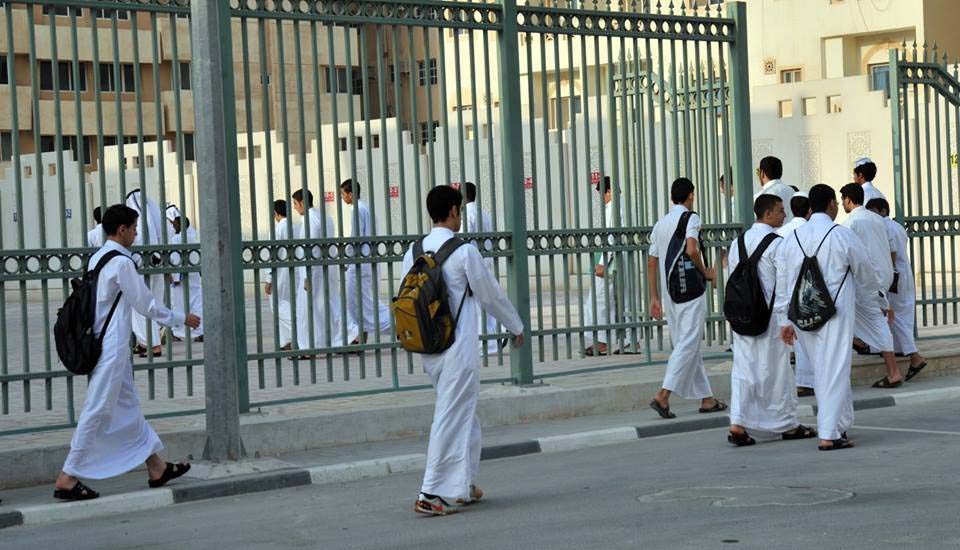
Ahead of the start of Qatar’s new academic year tomorrow (Sept. 6), the Ministry of Interior has issued a list of tips for parents and students to get back into their routines and beat the back-to-school blues.
A Doha-based psychologist has also added some expert advice to help make the first few weeks back as smooth as possible.
For many families, the long summer vacation is often spent traveling, visiting friends and family and taking life at a slower pace for nine weeks. However, the absence of a regular routine, lots of treats and “spoiling” from relatives and later nights can take its toll on children’s behavior and attitudes.
To help with the adjustment, the MOI suggested on its Facebook page that parents sit down with kids ahead of the first day back to talk through the expected new routine and get them involved in preparations.
Tips for easing the transition include:
- Make sure children have enough sleep;
- Ensure the food they eat is nutritious;
- Help to structure their days in a way that balances time for homework and relaxing;
- Don’t allow them to spend time on video games or on social media unsupervised; and
- Buy a school bag that suits the age and weight of your child, taking care not to overfill it with unnecessary items.
Road safety
Practical safety advice also included ensuring children understand appropriate behavior while on school buses, teaching them how to safely wait for their transportation and general traffic awareness when crossing roads.

Schools have for some months been working with Qatar’s public works authority to improve the road structure and traffic flow around their sites, to help reduce the possibility of accidents.
Under Ashghal’s School Zone Safety Program, reduced speed limits, marked pedestrian crossings, speed bumps, rumble strips and designated pick-up and drop-off zones have been created around all newly-built schools, and existing schools can request the changes around their locations.
Last fall, headteachers of two international schools publicly spoke out against reckless and fast driving around their premises, warning drivers to adopt a “more respectful attitude” when picking up and dropping off children.
The call followed an incident last October in which a primary student at Doha College’s West Bay campus was struck by a car when crossing the road with her mother and younger sibling outside the school.
Meanwhile, with hundreds of thousands of students set to return to school, the MOI has also advised commuters to plan ahead to navigate the congested roads by leaving extra time for their journeys.
Car pooling for pick-up and drop-off, seeking out alternative routes and keeping vehicles maintained to avoid breakdowns are among the common-sense tips given to motorists, Gulf Times reports.
Expert advice
While some children are desperate to return to school to see their friends again after a long break, others aren’t so keen.
According to clinical psychologist Dr. Dionne Joseph, getting back into the routine can be particularly hard foreigners who are returning from their home countries.
“Expat families are under additional pressure, separated from family and friends who they may have spent time with on holiday. And in this environment, where there is a churn of people, as friends leave, it can create further anxiety,” she told Doha News.
To reassure children, parents should be careful to not transfer any of their own anxieties onto their children.

“You need to be aware that children model the behavior of their parents, Joseph said.
“If you seem anxious and upset, they will pick up on that. As a parent, make sure you look after your own emotional and psychological well being – keep up friendships, social networks and activities, otherwise you won’t be able to help your children,” she added.
Don’t over-reassure
For children who are starting a new school or are apprehensive about the return to class, Joseph advised parents to be empathetic but warned them not to promise everything would be perfect.
“Parents can unwittingly reinforce anxiety by over-reassuring. This level of apprehension starting something new is a completely normal rite of passage. Tens of millions of children have gone through it and survived.”
Understanding the developmental stages of children is important to avoid overburdening them with expectations which are beyond them at a particular age, she added.

“For children starting school for the first time, it is completely normal for them to cry. They are not having an emotional meltdown, they are just reacting to new circumstances. If a child’s overall psychological health is otherwise good, they can cope with this.”
Handle tearful children at the school gate in a matter-of-fact way, Joseph said, adding: “Don’t express your own anxiety. Tell them you are going to drop them off and that you will come back to pick them up later in the afternoon.”
Regression
Regression in some habits, such as bed wetting and nightmares are common, as children process their new environment, and shouldn’t be a cause for concern.
Other practical tips Joseph suggested to help children cope include ensuring they get enough sleep and have regular bed-times: “Overtiredness manifests itself in all sorts of behavior issues,” she said.
Building time into children’s day just to relax and unwind after school is also vital, particularly in the first months of the new term, when the weather remains hot and humid.
How’s the return to school going for you? Thoughts?







